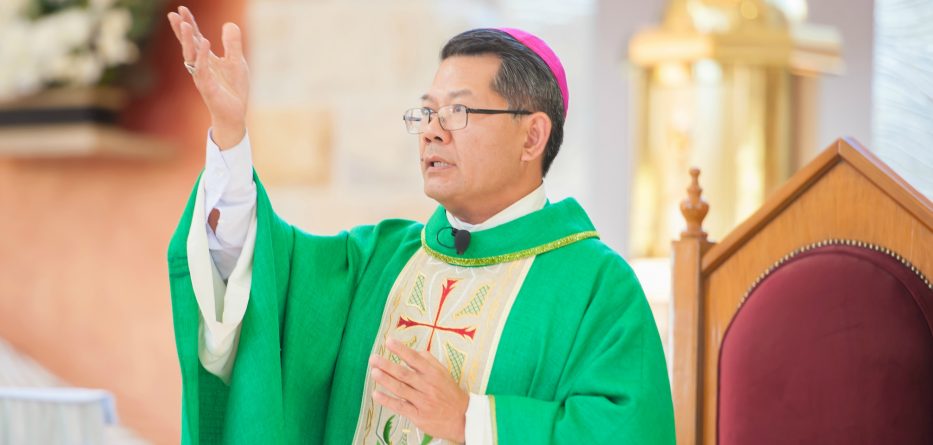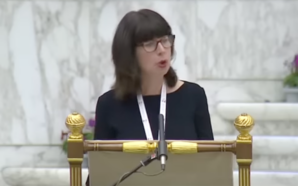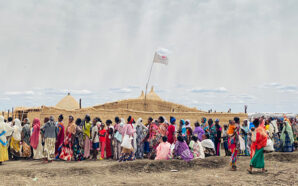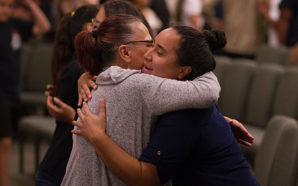Most Reverend Vincent Long Van Nguyen OFM Conv DD STL, Bishop of Parramatta
Homily for the 19th Sunday in Ordinary Time Year B 2018 at St Andrew the Apostle Parish, Marayong
12 August 2018
Dear sisters and brothers,
One of the news stories that got people talking this week is the plight of our farmers. Drought, fluctuating prices, instability in global markets et cetera take physical and emotional toll on them. I watched and listened to some of these stories, which made me aware of the challenges our food producers face. One of the comments I heard really made me think beyond the drought relief measures, including generous donations from the city dwellers. It said that the challenge is not only natural drought. It is the political drought and the vision drought. Until there is a comprehensive and long-term vision and strategy, it is difficult for our farmers to stay on the land.
Farmers are not the only ones who are quitting or tempted to quit. Catholics too face many formidable challenges in the world today. We may not have to deal with droughts, bushfires, floods and other disasters. However, the Church in Australia has had a litany of endemic problems, which have been exposed for all the world to see. As a result, we are much diminished in terms of resources, human capital and most of all our standing in society. We have been battered and bruised. We’ve been reduced in number and status. Our credibility is in tatters.
The words of St Paul come to mind: “We have become the spectacle to the world and the refuse in the sight of others”. These words don’t seem like an exaggeration in the light of the Royal Commission and its impact on the public perception of the Catholic Church. No wonder many Catholics are leaving or tempted to leave. For those of us who are staying faithful or hanging on by our fingernails, we ask ourselves, “What keeps us going? What replenishes our energy and sustains our hope? How can we move towards a better future?”
The Word of God this Sunday may not give us all the answers we want. But it does appeal for a sense of trust in the God of the journey. It encourages us to look beyond the pain of the present to the hope of the future. It points us to the source of nourishment so that we have the strength to work towards that future.
In the first reading today, we hear the story of the prophet Elijah who was on the run from his enemies. He had had moments of triumph and glory. He had killed the false prophets and he had witnessed God’s revelation on Mount Carmel through a gentle breeze. However, as the enemies pursued him relentlessly, he wanted to give up, not only the journey but the whole enterprise of being God’s messenger. This sense of despair was similar to that of the people of Israel facing hunger and thirst in the wilderness. Just as the Israelites received manna for their nourishment, Elijah also received food for the journey. He was told “get up and eat” the food that had been prepared by an angel. Elijah obliged, and he was given a new lease of life. The food gave him not only the nourishment his body craved for but also the hope his soul needed. As a result, he was able to accomplish his journey and his mission.
In the Gospel, Jesus points to the source of nourishment, which would enable the people to find true fulfilment. Following the miracle of the loaves and fish, Jesus had alluded to a deeper level of nourishment. The people, however, failed to understand the meaning of the new manna. Instead of rising to a new level of consciousness, they were still stuck in shallow search for temporary relief. They wanted more of the same old bread. They were in a parallel universe. The old manna sustained the pilgrims on their way to the Promise Land. The new manna, which was Jesus himself would be the true source of nourishment for those who embark on the journey of discipleship. “The bread I shall give is my flesh for the life of the world.” It is a food that transforms us into his instruments and agents of change.
Brothers and sisters,
“What keeps us going? What replenishes our energy and sustains our hope? How can we move towards a better future?” These and similar questions continue to be asked as we face the long and hard journey before us. The Word of God invites us to avail ourselves of God’s gift of nourishment in Christ. It is by our participation at his table of the Eucharist. We must get up and eat like Elijah. But we also must become what we eat. We must allow Christ to permeate every fibre of our being; we must let every aspect of our life be influenced by him so that we become transformed in our attitude and behaviour. This is the lifetime project. If the experience of Elijah is any guide, it is the journey and not the destination that shapes us into who are meant to be.
We may be tempted to give up like Elijah. Wherever we are on the journey of discipleship, let us remember to draw deeply from the source of our true nourishment. It is Christ who has the power to nourish, sustain and enliven us. With Christ as our companion, may we learn to act justly, to love tenderly and walk humbly with one another on the journey of Christian life, service and witness.








